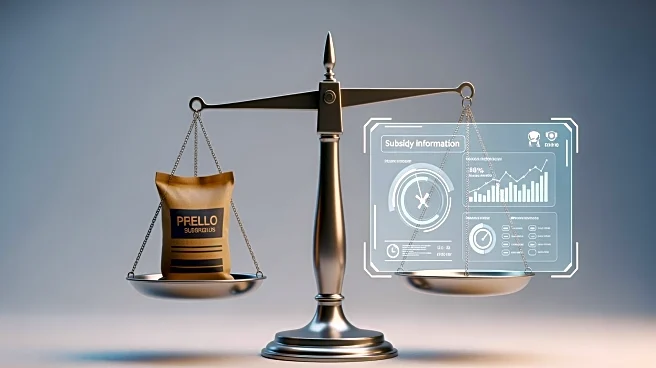What's Happening?
The Union Agriculture Ministry of India is contemplating a significant policy shift by transferring fertiliser subsidies directly to farmers' bank accounts. This move aims to enhance transparency and empower
farmers to purchase fertilisers from any source. Union Agriculture Minister Shivraj Singh Chouhan has been in discussions with farmers regarding these subsidy reforms. Currently, under the 'DBT in Fertilisers' system, subsidies are provided to fertiliser companies based on actual sales to farmers, authenticated through Aadhaar at retail shops. The proposed change would ensure that subsidies reach farmers directly, potentially reducing leakages and improving the efficiency of subsidy distribution. The government has highlighted the importance of this reform in ensuring that farmers receive the intended benefits without intermediaries.
Why It's Important?
This policy shift is crucial as it could significantly impact the agricultural sector in India by ensuring that subsidies are used more effectively. Direct transfers to farmers' accounts could reduce corruption and inefficiencies associated with the current system, where subsidies are routed through fertiliser companies. This change could also empower farmers by giving them more purchasing power and choice in the market. Additionally, the move aligns with broader government efforts to promote transparency and accountability in subsidy distribution. The reform could also encourage more sustainable farming practices, as Minister Chouhan has emphasized the need to reduce excessive use of chemical fertilisers, which can harm soil health and productivity.
What's Next?
If implemented, the direct subsidy transfer could lead to significant changes in the agricultural supply chain. Fertiliser companies might need to adjust their business models to accommodate the new system. Farmers could experience increased autonomy in their purchasing decisions, potentially leading to a shift towards more sustainable agricultural practices. The government will likely continue consultations with stakeholders to refine the policy and address any challenges in its implementation. Monitoring and evaluation mechanisms will be crucial to ensure the effectiveness of the direct subsidy transfer system.
Beyond the Headlines
The proposed reform could have broader implications for India's agricultural policy and rural economy. By reducing dependency on intermediaries, the government could foster a more competitive and transparent market environment. This change might also encourage innovation in the agricultural sector, as farmers seek more efficient and sustainable farming methods. Additionally, the reform could serve as a model for other subsidy programs, promoting direct benefit transfers in various sectors to enhance transparency and reduce corruption.








